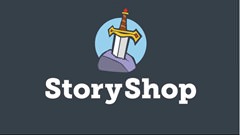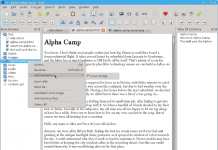 TechCrunch has a story about StoryShop, a story planning app that is supposed to help automate the process of creating stories. The idea is apparently that it takes you step by step through the process, breaking it down into simpler steps, much like Scrivener helps break down into smaller chunks the process of writing longer works in general. TechCrunch’s John Biggs writes:
TechCrunch has a story about StoryShop, a story planning app that is supposed to help automate the process of creating stories. The idea is apparently that it takes you step by step through the process, breaking it down into simpler steps, much like Scrivener helps break down into smaller chunks the process of writing longer works in general. TechCrunch’s John Biggs writes:
Created by Sean Platt, Johnny B. Truant, and David Wright, the product walks you through the steps of character creation, scene writing, and plot. By cutting the process of fiction into manageable steps the team makes it far less daunting to write your magnum opus about space vampires from the Old West who wear steampunk gear.
It apparently grew out of tools that the developers, who are also writers themselves, created to help themselves manage the process of keeping characters and settings straight given how much they write (about two million words per year). The developers claim in their promotional video that “the explosive growth of e-books and the advent of self-publishing” means the writing business has suddenly gotten hugely competitive, and potential new writers need some kind of an edge so they don’t have to take five years to write a book of their own.
For whatever reason, the TechCrunch article doesn’t link to it, but the StoryShop project has a Kickstarter page. As of this writing, it’s racked up about $46,000 in pledges of an $80,000 goal, with 20 days to go. At that rate, they’ll likely make goal easily. The Kickstarter does at least have the benefit of a reasonable funding goal, and wide enough appeal to reach it (unlike the “Ultimate e-Reader,” which is currently only up to about $3,000 of its $220,000 goal, 1/10 of the way through its crowdfunding period).
That being said, I’m skeptical of the price points for the software. $25 gets you three months of using it, $49 offers 8 months, $99 18 months, and you have to pledge $299 to get lifetime access to the program. This is for a Kickstarter that’s still in the funding stage and doesn’t even have anything substantive like an actual program to offer for such an exorbitant fee. And that’s the “Early Bird” pledge level, which implies that when it sells out, they’ll replace it with a level that costs even more for the same benefits! Furthermore, the trend for most Kickstarters is that they cost less than the product will cost once it hits its mass-production version, so assuming the Kickstarter funds, the final version of this software will probably cost still more than that.
Compare that to Scrivener, which charges about $40 for a program you can use forever. (It may charge again when it comes out with its next point-0 version, but even then, it’ll probably just be another $40 or so and then you can use that forever—or you can keep right on using the old version without paying another cent.) I’m highly dubious of this new subscription software model for tools that ought to be pay-once-and-use-forever.
Granted, the cases are not exactly identical, since Scrivener is about how you write, rather than about what you write. But that being said, there are plenty of other, cheaper options for coming up with inspiration and inventing characters and plots. I’ve even written about some of them, such as the Storymatic cards and Rory’s Story Cubes, or Tarot for Writers. They might not have the gee-whiz factor of a Kickstarter for a new computer program that claims to let you create “characters so real, you’ll expect them to send you friend requests,” but they’re also ready to use right now and don’t require buying into a $300 pig in a poke.
It’s also worth noting that writers have gotten by for centuries without such a computer program. Indeed, many or most writers who are happily earning a living right now use no tools more involved than a text editor and the inside of their own heads, and they certainly don’t take any “five years” to write their books. Is paying $300 supposed to put you on the same level as people who don’t need such a tool at all?
StoryShop might have its uses, and I certainly wouldn’t mind trying it out just for fun, but I think it needs to be a lot more reasonably priced before very many people would seriously consider using it.


































Think of StoryShop as trainer wheels for would-be writers. Some of those who want to write don’t feel confident enough to take off on their own. They want to be guided, step-by-step, through a process. Hopefully, their confidence will improve.
Others disdain training wheels. My first bike ride was without them. I charged off, finding that balance came easily. What didn’t come easily was backpedaling to brake. To help me stop, some kids in my neighborhood guided me a couple of blocks to a lawn that wasn’t blocked by a curb. I rode out onto that lawn, stopped pedaling in leu of braking, and fell over onto the grass. I soon learned to brake.
This writing scheme wouldn’t work with me anyway. I may have a general idea what I want to say and the general progress of the story before I start, but I’ve never been able to make an outline work. I’m like a major novelist I heard interviewed yesterday. I must write a book to find out how it turns out. I keep writing until I like how it progresses and ends.
StoryShop may also be a symptom of something more disturbing, something you’re hearing commented about increasingly. Today’s college students, counselors say, have trouble coping with adversity. They want to live in a protective cocoon, given high grades for mediocre work, told they’re wonderful when they’re not, and spared hearing any point of view they dislike. There are some disturbing statistics that suggest that they believe that views that upset some (so-called hate speech) should be banned. Thinking free speech means that the only speech permitted is inoffensive speech is utter nonsense. In the worst depths of Nazi and communist oppression, you could still complain about the weather.
And if the campus near where I live is any guide, they like living in a regimented, rule-obsessed, and heavily policed world. To give one illustration. That nearby campus is where I went to college in the late 1960s. As a student, I never recall seeing a cop on campus. Now it’s virtually impossible to cross the campus without seeing one.
And when I attended, the plaza atop the tallest building was open until the entire building was locked up in late evening. Now, the university only grudgingly allows highly supervised student access to the top with its marvelous view for a few hours one evening a week. I’ve tried to find out why, and the best I can determine, the university thinks there’s a risk students will throw heavy objects off the top. Are today’s students that stupid? I think not. I think the university is simply paranoid, overprotective, and regards most students as child-like and incompetent. Alas, some seem to agree with that assessment, including the editors of the student paper.
I wrote a letter to the student paper commenting on one such paternalistic article and suggesting that students who think that they can step out of this paternalistic bubble and make a success in life are fooling themselves, that they’re likely to find themselves permanently crippled by being treated as a child to the absurd age of 22. Alas, that letter doesn’t seemed to have been published.
This pricey StoryShop scheme seems to cater to the same risk-adverse climate. Better advice would suggest these would-be writers simply plunge ahead with Scrivener or a similar tool, disdaining those training wheels. They may make mistakes. But they’ll be better for them and perhaps become better writers.
Those who’d like free, practical advice on writing might want to listen to podcasts on the topic. I recommend Writing Excuses. The hosts are successful writers of fantasy, sci-fi, and graphic novels, but what they say applies to almost any writing.
http://www.writingexcuses.com
https://itunes.apple.com/us/podcast/writing-excuses/id990871441
–Mike Perry